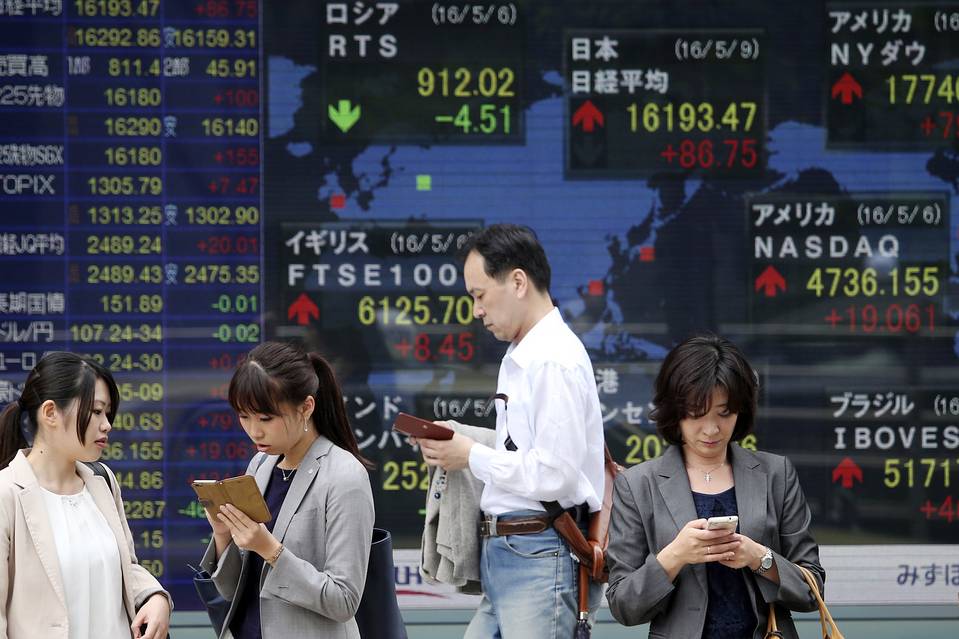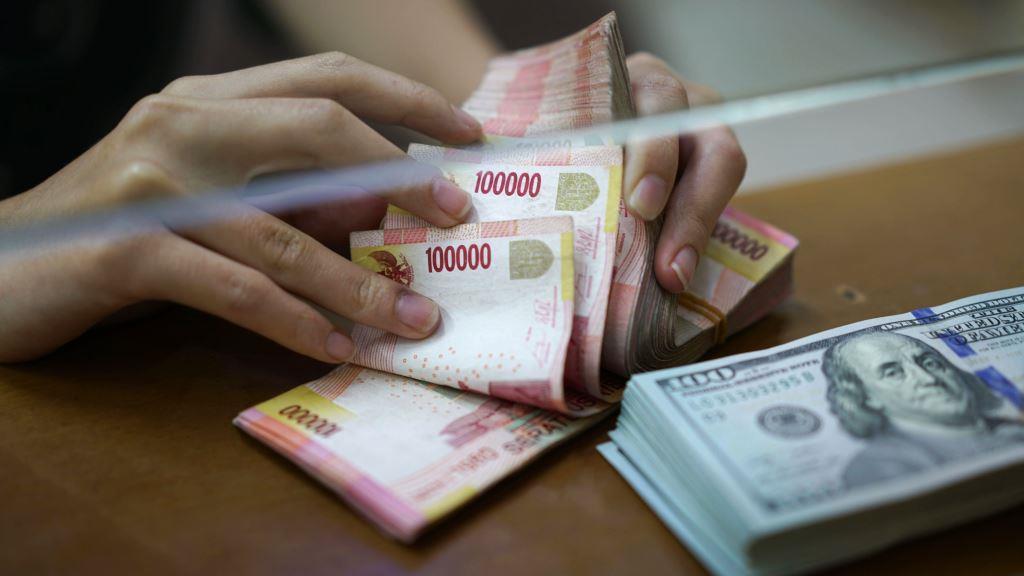Economy
Asian Stocks Finish Mostly Higher

By Investors Hub
Asian stocks finished mostly higher on Wednesday as higher commodity prices lifted resource stocks and the Japanese yen weakened on solid U.S. non-manufacturing activity data released overnight. Nevertheless, renewed trade concerns helped to limit overall gains to some extent.
China’s Shanghai Composite Index finished marginally higher at 3,115.68, while Hong Kong’s Hang Seng Index gained half a percent to close at 31,259.10.
Japanese shares hit a two-week high as technology stocks followed their U.S. peers higher. The Nikkei 225 Index closed up 86.19 points or 0.4 percent at 22,625.73. The broader Topix Index closed 0.2 percent higher at 1,777.59.
Exporters like Panasonic, Toyota Motor and Sony climbed 1-3 percent. Sharp Corp. gained about 1 percent after it agreed to acquire Toshiba’s personal computer business for 4 billion yen, or $36 million.
Meanwhile, Subaru Corp. shares shed 1.4 percent after the automaker said it found more cars affected by data fabrication.
Australian shares finished modestly higher after the Nasdaq hit a record high for the second consecutive session overnight. The benchmark S&P/ASX200 Index rose 30.20 points or 0.5 percent to 6,025.10, while the broader All Ordinaries Index ended up 28.90 points or 0.5 percent at 6,137.40.
Higher base metal prices helped lift miners, with BHP Billiton, Fortescue Metals Group and Rio Tinto closing up between 1 percent and 2.5 percent. Gold miner Newcrest Mining rallied 2.1 percent after an increase in gold prices.
Energy stocks like Woodside Petroleum, Santos Oil Search and Origin Energy jumped 2-3 percent after crude oil futures rose more than 1 percent on Tuesday.
On the other hand, ANZ slid half a percent after criminal charges were laid against the bank. The other three big banks dropped 1-2 percent.
Metcash fell 2.2 percent after the IGA supermarkets supplier said it would take a $352 million impairment in its full-year results.
On the data front, Australia’s gross domestic product gained a seasonally adjusted 1.0 percent sequentially in the first three months of 2018, the Australian Bureau of Statistics said.
That beat expectations for an increase of 0.8 percent following the 0.4 percent gain in the previous three months. On a yearly basis, GDP expanded 3.1 percent, up from 2.4 percent in the three months prior.
Economy
Unlisted Securities Shed 0.21% on Profit-taking

By Adedapo Adesanya
It was a bad day for the NASD Over-the-Counter (OTC) Securities Exchange on Monday, February 23, after it slumped 0.21 per cent at the close of business.
This pullback was influenced by profit-taking by investors in four securities, which overpowered the gains recorded by six others.
According to data, Central Securities Clearing System (CSCS) Plc dipped N3.79 to sell at N67.21 per unit compared with the previous N71.00 per unit, UBN Property Plc lost 13 Kobo to close at N1.98 per share versus N2.11 per share, Resourcery Plc fell 3 Kobo to 36 Kobo per unit from 39 Kobo per unit, and Geo-Fluids Plc depreciated 1 Kobo to close at N3.31 per share versus N3.32 per share.
As a result, the bourse’s market capitalisation went down by N5.04 billion to N2.384 trillion from N2.389 trillion, and the NASD Unlisted Security Index (NSI) decreased by 8.42 points to 3,985.90 points from 3,994.32 points.
Business Post reports that NIPCO Plc rose N23.00 to N253.00 per unit from N230.00 per unit, MRS Oil Plc added N14.50 to close at N214.50 per share versus N200.00 per share, FrieslandCampina Wamco Nigeria Plc grew by N1.85 to N93.40 per unit from N91.55 per unit, NASD Plc soared 40 Kobo to N51.28 per share from N50.88 per share, First Trust Mortgage Bank Plc advanced by 12 Kobo to N1.32 per unit from N1.20 per unit, and Food Concepts Plc improved by 6 Kobo to N3.76 per share from N3.70 per share.
As for the trading data, the volume of securities jumped 99.7 per cent to 7.3 million units from 3.7 million units, but the value depleted by 26.8 per cent to N61.8 million from N84.5 million, and the number of deals slipped 7.1 per cent to 39 deals from 42 deals.
At the close of trades, CSCS Plc was the most active stock by value (year-to-date) with 32.9 million units sold for N1.9 billion, followed by Geo-Fluids Plc with 120.6 million units valued at N473.4 million, and Resourcery Plc with 1.05 billion units exchanged for N408.7 million.
Resourcery Plc closed the session as the most active stock by volume (year-to-date) with 1.05 billion units worth N408.7 million, followed by Geo-Fluids Plc with 120.6 million units valued at N473.4 million, and CSCS Plc with 32.9 million units traded for N1.9 billion.
Economy
Customs Street Opens Week Bullish After 0.66% Surge

By Dipo Olowookere
The Nigerian Exchange (NGX) Limited ended the first trading session of the week on a positive note after it chalked up 0.66 per cent on Monday.
The gains recorded yesterday were boosted by the 3.42 per cent rise by the insurance sector, the 1.44 per cent surge by the banking index, and the 1.30 per cent leap by the industrial goods counter. They offset the 0.20 per cent loss posted by the energy sector and a 0.11 per cent decline suffered by the consumer goods industry.
Consequently, the All-Share Index (ASI) closed higher by 1,273.78 points to 196,263.55 points from 194,989.77 points, and the market capitalisation appreciated by N805 billion to N125.969 trillion from N125.164 trillion.
Business Post observed that investor sentiment turned bearish during the session after Customs Street ended with 34 price losers and 33 price gainers, representing a negative market breadth index.
Fortis Global Insurance gained 10.00 per cent to trade at 66 Kobo, Okomu Oil expanded by 10.00 per cent to N1,605.60, Fidson rose by 9.90 per cent to N95.50, NPF Microfinance Bank rose by 9.89 per cent to N6.89, and Infinity Trust Mortgage Bank jumped 9.84 per cent to N17.30.
On the flip side, The Initiates weakened by 10.00 per cent to N17.55, Deap Capital deflated by 9.97 per cent to N6.86, LivingTrust Mortgage Bank went down by 9.92 per cent to N5.90, Multiverse lost 9.92 per cent to close at N22.70 per cent, and Ellah Lakes shrank by 9.77 per cent to N11.55.
Yesterday, market participants traded 1.3 billion shares worth N31.5 billion in 95,091 compared with the 820.5 million shares valued at N28.3 billion in 63,507 deals last Friday, indicating an increase in the trading volume, value, and number of deals by 58.44 per cent, 11.31 per cent, and 49.73 per cent apiece.
Japaul ended the session as the busiest stock after selling 474.0 million units worth N2.0 billion, Chams traded 51.5 million units for N221.3 million, Jaiz Bank exchanged 48.3 million units for N566.9 million, Secure Electronic Technology transacted 46.3 million units worth N68.8 million, and Mutual Benefits sold 42.5 million units valued at N242.5 million.
Economy
Naira Further Crashes to N1,349/$1 at Official Market

By Adedapo Adesanya
The first trading day in the currency market in Nigeria ended bearish for the Naira as its value further weakened against the US Dollar in the Nigerian Autonomous Foreign Exchange Market (NAFEX) on Monday by N2.92 or 0.22 per cent to N1,349.24/$1 from the N1,346.32/$1 it was traded last Friday.
Also in the spot market, the Nigerian currency depreciated against the Pound Sterling by N6.62 during the trading day to close at N1,821.87/£1 versus the preceding session’s N1,815.25/£1, and lost N6.80 on the Euro to settle at N1,591.42/€1, in contrast to the previous rate of N1,584.62/€1.
At the GTBank forex desk, the Nigerian Naira crashed against the greenback yesterday by N1 to quote at N1,357/$1 versus the preceding session’s closing value of N1,356/$1, but in the black market, the Naira appreciated by N5 to close at N1,365/$1 compared with the preceding trading day’s N1,370/$1.
The Naira slide came amid renewed pressure as weekly inflows declined, as Bureaux De Change (BDC) operators were unable to purchase Dollars from banks two weeks after the Central Bank of Nigeria (CBN) reopened the official FX Market window to them.
It had been expected that BDCs would help to further deflate the parallel market premium, but according to reports, BDC operators had yet to commence FX purchases from commercial banks, two weeks after the apex bank said legitimate agents can access up to $150,000 from the banks.
There were no FX inflows from the CBN during the past week, according to a report by the research department of Coronation Merchant Bank.
Meanwhile, Nigeria’s external reserves, which provide the CBN with firepower to support the naira, rose to $48.77 billion as of February 19, 2026.
Meanwhile, the cryptocurrency market was in the red as a broader risk-off shift tied to an emerging “AI scare trade” in equities is weighing on crypto markets.
This is leading traders to sell, while the sharp liquidation events that typically attract dip buyers have seen no such move recently, with Bitcoin (BTC) down by 3.2 per cent to $62,901.86.
Further, Ethereum (ETH) depreciated by 2.5 per cent to $1,821.13, Cardano (ADA) slid 1.9 per cent to $0.2571, Litecoin (LTC) went down by 1.9 per cent to $50.45, Solana (SOL) shrank 1.8 per cent to $76.54, Dogecoin (DOGE) declined by 1.7 per cent to $0.0912, Ripple (XRP) slumped 1.2 per cent to $1.32, and Binance Coin (BNB) lost 0.6 per cent to sell for $589.88, while the US Dollar Tether (USDT) and the US Dollar Coin (USDC) closed flat at $1.00 each.
-

 Feature/OPED6 years ago
Feature/OPED6 years agoDavos was Different this year
-
Travel/Tourism10 years ago
Lagos Seals Western Lodge Hotel In Ikorodu
-

 Showbiz3 years ago
Showbiz3 years agoEstranged Lover Releases Videos of Empress Njamah Bathing
-

 Banking8 years ago
Banking8 years agoSort Codes of GTBank Branches in Nigeria
-

 Economy3 years ago
Economy3 years agoSubsidy Removal: CNG at N130 Per Litre Cheaper Than Petrol—IPMAN
-

 Banking3 years ago
Banking3 years agoSort Codes of UBA Branches in Nigeria
-

 Banking3 years ago
Banking3 years agoFirst Bank Announces Planned Downtime
-

 Sports3 years ago
Sports3 years agoHighest Paid Nigerian Footballer – How Much Do Nigerian Footballers Earn












